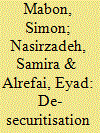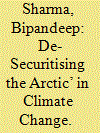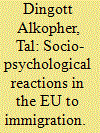|
|
|
Sort Order |
|
|
|
Items / Page
|
|
|
|
|
|
|
| Srl | Item |
| 1 |
ID:
183248


|
|
|
|
|
| Summary/Abstract |
Since 1979, relations between Saudi Arabia and Iran have oscillated between periods of overt hostility and apparent rapprochement, yet since 2003 the two have engaged in a vitriolic competition that has spread across regional affairs, to devastating effect in Lebanon, Syria, Bahrain, Iraq and Yemen. Central to much of this are efforts to securitise the other in the eyes of external audiences, discursively presenting the rivalry in the language of security. Yet despite their competing claims to Islamic legitimacy and leadership, there are strong pragmatic reasons related to political and economic concerns for the two states to engage with one another. Underpinning this, however, is a need for de-securitisation moves, reducing tensions between the two through framing relations in terms of ‘normal’ politics rather than the language of security.
|
|
|
|
|
|
|
|
|
|
|
|
|
|
|
|
| 2 |
ID:
182611


|
|
|
|
|
| Summary/Abstract |
The rapidly transforming Arctic has led to rethink the concept of security in the region. The increasing global warming and opening up of the Arctic have brought multiple geopolitical issues before the Arctic and non-Arctic states.1 In pursuit of their perceived geopolitical, geo-economics and strategic interests, a race to ‘securitise the Arctic’ has started amongst the major Arctic states. This process of securitisation appears to be dictated and driven not only by traditional military-strategic considerations but also by non-traditional security threat dilemmas related to energy, environment, sustainability, human security, connectivity, etc. As the old and the new Arctic challenges are being taken out of the realm of ‘normal politics’ and placed in the contested domain of ‘security politics’, the Asian states, that are directly or indirectly impacted by the changing Arctic realise that securitisation of the Arctic is leaving little space for addressing common issues of global concern. This study argues that all these emerging issues (otherwise perceived as ‘security threats’) in the Arctic, instead of being addressed in the securitisation framework, could and should be approached and addressed as compelling reasons for mutual cooperation and thus in need of de-securitisation.
|
|
|
|
|
|
|
|
|
|
|
|
|
|
|
|
| 3 |
ID:
160617


|
|
|
|
|
| Summary/Abstract |
This paper examines the EU and EU member states’ reactions to the 2015 refugee crisis from an ontological security perspective while arguing that these reactions are the product of three socio-psychological lenses, which have led to various responses to the perceived threat. The first reaction, ascribed especially to the Visegrad Four, is the “securitise-the-self” reaction to feelings of anxiety and ontological insecurity and involves reaffirmation of national biographical narratives and national immigration policies at the expense of supranational European policies. The second reaction is illustrated by the European Commission's response to the refugee crisis and involves “managing securitisation.” Accordingly, the Commission's reaction to ontological insecurity when faced with the challenge of unmanaged migration was to reaffirm the EU's semi-sovereign identity (collective border control competencies) while preserving a global discourse on human rights and refugee-related inclusive norms. The third reaction stemmed from viewing the crisis with the lenses of “empathy” and “desecuritisation” and is best illustrated by Germany's temporary “open door” policy on refugees that was driven by a psychological lack of perceived threat from the “immigrant-other” and a “civilian power” collective identity. The paper argues that recognising these three lenses can help us to understand socio-psychological reactions to immigration in the EU.
|
|
|
|
|
|
|
|
|
|
|
|
|
|
|
|
|
|
|
|
|